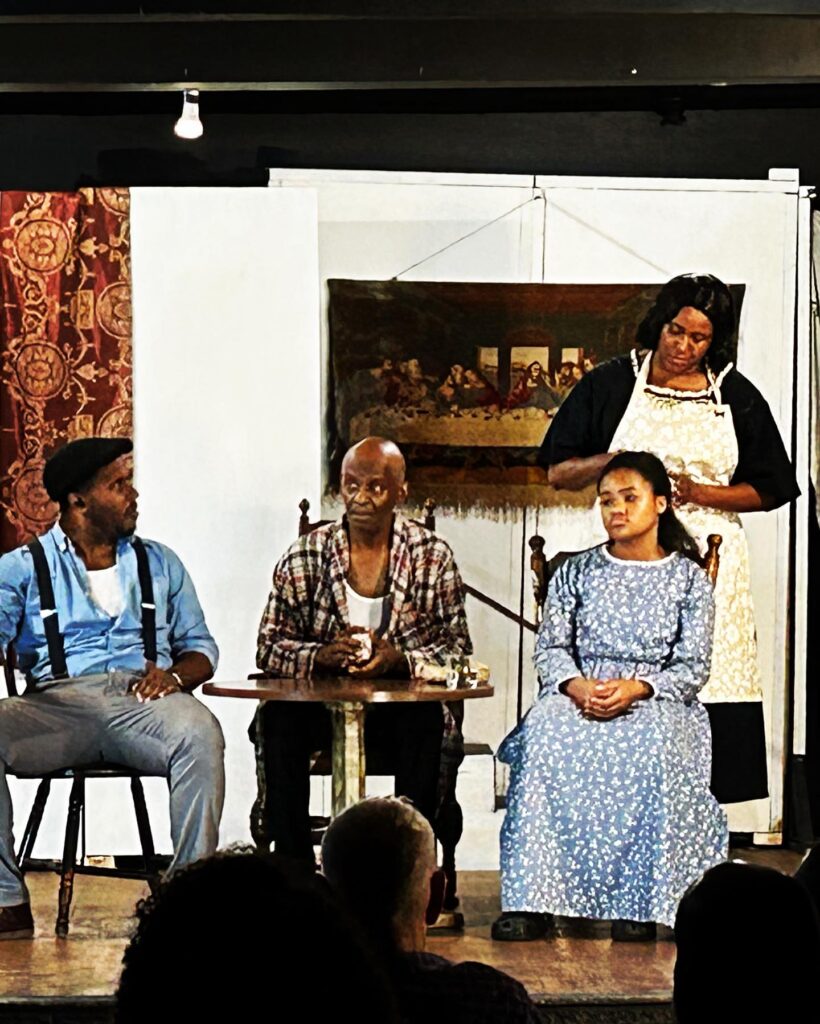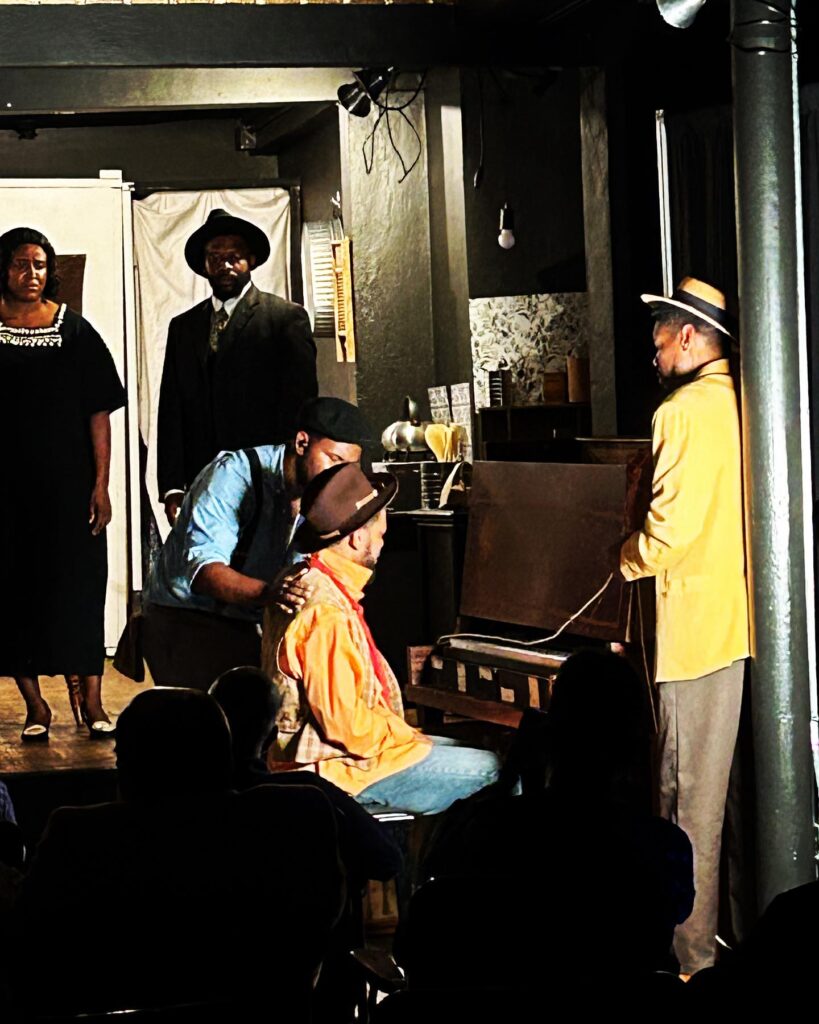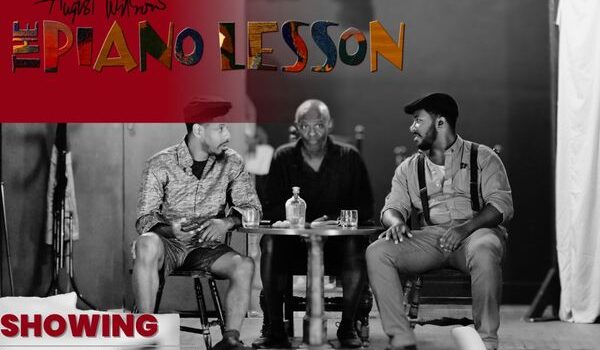By Lynn Venhaus
August Wilson’s powerful, haunting “The Piano Lesson” is an ambitious kick-off for an emerging theater company’s inaugural production in their new home at South Side Spaces.
The Encore Theater Group may lack resources, as a low-budget scenic design in a church basement indicates, but they are not short on effort and drive.
Wilson’s drama, his fourth play of the Pittsburgh, or Century, Cycle, is set in the Hill District in 1936, after the Great Depression, and focuses on themes of legacy, identity, and healing.
The renowned Wilson wrote a series of 10 plays chronicling the black experience in 20th century America, and each one is set in a different decade, with nine of them in the same Pittsburgh neighborhood where Wilson grew up. For this play, he won the Pulitzer Prize for Drama in 1990, and it was originally produced on Broadway in 1987.
In the Doaker Charles household, a battle is brewing between strong-willed siblings. At the center is the family’s prized piano, an heirloom because carvings of enslaved relatives are in the design.
Entrepreneur-ish sharecropper Boy Willie (Zachary Clark) wants to sell it to build the family fortune and has just arrived from Mississippi with a truck full of watermelons. His sister Berniece (understudy Angel Carter stepped in for Atiera “Tarrah” Currie) plans to go to any length to keep it and preserve their family history, for the images of their great-grandfather’s wife and son are on it. Their uncle (Don McClendon) stands in between, acting as the family storyteller, and the ghosts of the past resurface, for apparently, their home is haunted.
Wilson’s themes are universal, and Encore! director Jason J. Little concentrates on the family dynamics to present an intimate view of the African American experience — reflecting progress and change (or not).
Clark excels as the impulsive Boy Willie, who makes a strong case for using the money to buy the land where their ancestors worked as slaves. That way, they can honor them by taking back what their ancestors couldn’t own in their lifetime. But his family will be the voice of reason, talking about the importance of legacy and learning from the past.
The core male actors click when together on stage. Dennis Jethroe II is notable as comical Wining Boy, the elder brother of Doaker, who is a smooth-talking piano player and a gambler. He has a funny scene slickly selling shy Lymon spiffy clothes to go out on the town in, and often provides comic relief.
Alexander “Smoogie” Christian is a charmer as the well-meaning Lymon, who is trying to find his way in the world. Larry Green is genuine in his portrayal of the good-natured, sensible preacher Avery, who is sweet on Berniece. Don McClendon, a St. Louis stalwart with a lengthy stage and screen resume, lends gravitas as the head of household, trying to impart the wisdom of experience.
Their characters’ struggle to reconcile the past with their ancestral heritage needs to make a potent connection because Wilson had a lot to say here. Overall, more character-building would have helped to understand the conflicts and gradually feel the rationale of their choices and behaviors.
The supporting cast included Arriel Cummings as a lively gal pal Grace and Jada Little as Berniece’s dutiful but frightened 11-year-old daughter Maretha.

As the understudy, Angel Clark had to do the heavy lifting on opening night, and it is not easy to slip into such a demanding role. At first, she yells a lot at her brother, so you know there is underlying tension, things not spoken, and it’s crucial to understand their complicated relationship. She blames him for her husband Crawley’s death three years earlier.
Understanding the depth of the backstories is important to bring out the emotions, and confronting the ghosts of slavery makes for a hard-hitting show.
On opening night, just before curtain, a noisy thunderstorm unleashed a torrential downpour, and the thunder rolled and lightning struck outside for several hours, which could be heard, and somewhat hampered sound. That additional challenge could have affected the action on stage.
Pacing was an issue, as a planned runtime of 2 hours, 20 minutes took well over 3 and a half hours to complete (not counting late start because of storm). With a less-than-perfect first night under their belt, it is hoped that the rest of the run was less bumpy.
I saw this play during its second go-round by the Black Repertory Theatre of St. Louis in 2013, and it has stayed with me ever since that night in the Grandel. The Black Rep famously completed the Century Cycle – only the third company in the U.S. to do so – from 1988 to 2003 and has been repeating it. Their first production of “The Piano Lesson” was in 1992.
In their mission to bring another round of the American Century Cycle to St. Louis, they’ve earned St. Louis Theater Circle awards for outstanding production of a drama with “Two Trains Running” in 2022 and “Jitney” in 2023, and they’ve presented “Seven Guitars” in 2017 and “Fences” in 2018. The Clayton Community Theatre has also performed Wilson’s works, most recently “Ma Rainey’s Black Bottom” in 2021. They have been my introduction into the celebrated playwright’s works, and much appreciated.
Any opportunity to bring Wilson to St. Louis audience in today’s political climate is a good one, but the technical aspects need to be crisp, especially sound and lighting. The company’s executive director Effrem Grettenberger’s specialized lighting design and Jay B. Saffold’s sound design to mimic the supernatural happenings are effective, but there were some technical issues with cues and hard-to-hear dialogue at other times.
Currie, the company’s artistic director, assembled the modest scenic design and handled the costume design with flair, creating character statements through bold color choices and vintage wear. The hats were terrific.
Encore! is well-intentioned about art nourishing the soul, and offering a sense of community, inclusion, and diversity. Their next production is “Cuentame,” in which people will share their personal stories, in November.
Just FYI: To explore “The Piano Lesson” further, Netflix will stream a filmed production of the recent Broadway revival starring Samuel L. Jackson as Doaker and John David Washington as Boy Willie, produced by Denzel Washington, sometime either later this year or early in 2024.

Encore Theatre Group presents August Wilson’s “The Piano Lesson” June 30 – July 9, with Friday and Saturday performances at 8 p.m. and Sunday matinees at 2:30 p.m. at 2607 Potomac in south St. Louis (South Side Spaces). For more information: www.encorestl.org. You can learn more about the cast and crew here:. https://our.show/pianolesson

Lynn (Zipfel) Venhaus has had a continuous byline in St. Louis metro region publications since 1978. She writes features and news for Belleville News-Democrat and contributes to St. Louis magazine and other publications.
She is a Rotten Tomatoes-approved film critic, currently reviews films for Webster-Kirkwood Times and KTRS Radio, covers entertainment for PopLifeSTL.com and co-hosts podcast PopLifeSTL.com…Presents.
She is a member of Critics Choice Association, where she serves on the women’s and marketing committees; Alliance of Women Film Journalists; and on the board of the St. Louis Film Critics Association. She is a founding and board member of the St. Louis Theater Circle.
She is retired from teaching journalism/media as an adjunct college instructor.

